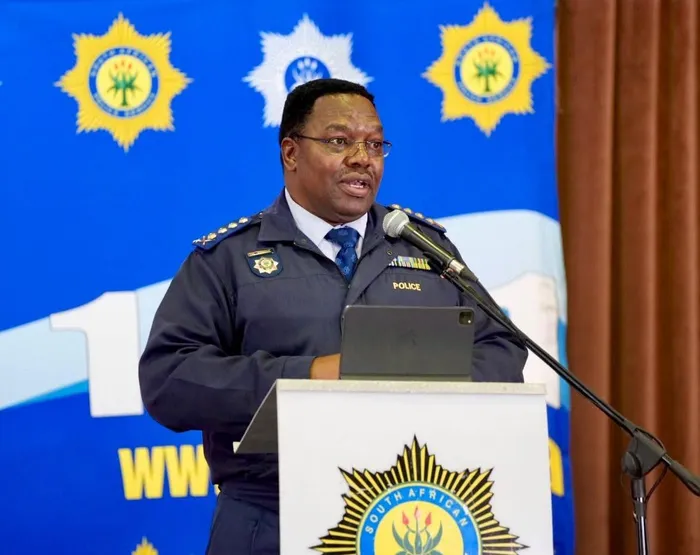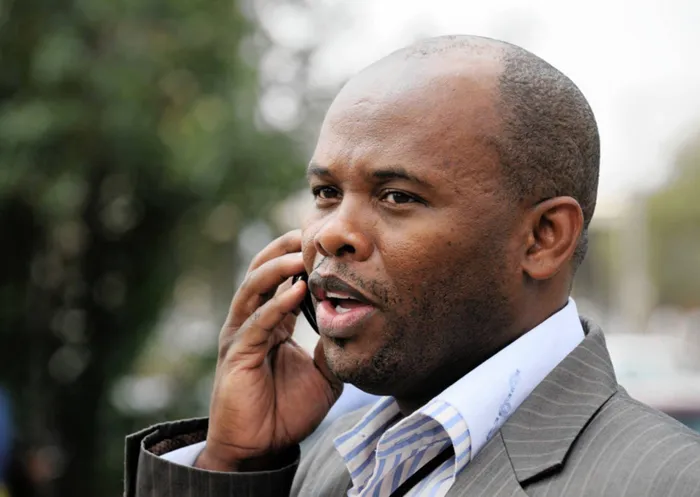
Police commissioner General Fannie Masemola
Image: Supplied/SAPS
Police Commissioner General Fannie Masemola has served his deputy, Lt-General Shadrack Sibiya, with a notice of intended suspension or temporary transfer, giving him until Monday to respond.
This is despite Sibiya’s ongoing case to challenge the decision to place him on a leave of absence.
Sibiya was asked to take a leave of absence following explosive allegations by KwaZulu-Natal Police Commissioner Lt-General Nhlanhla Mkhwanazi. Sibiya was accused of conspiring with Police Minister Senzo Mchunu to disband the political killings task team.
Sibiya launched an application at the Pretoria High Court seeking to have the decision to have him stay at home, set aside.

Gauteng Hawks' Major-General Shadrack Sibiya File picture: Chris Collingridge Deputy National Police Commissioner Lieutenant-General Shadrack Sibiya has been served with a notice of intended suspension.
Image: Chris Collingridge
Sibiya said Masemola’s decision to direct him to stay at home pending an investigation, which he took as part of disciplinary steps relating to misconduct allegations against him, needed to be set aside or declared unlawful because the National Commissioner did not comply with regulations.
However, Masemola argued that despite being barred from work, he would only allow Sibiya to make representations on why he should not be barred from returning to work after a preliminary investigation was completed.
In the letter issued on August 19, Masemola warned that should representation not be received by Monday, it will be accepted that Sibiya does not wish to say anything and his possible suspension or transfer will be decided without further notice.
“You are hereby notified that your suspension or temporary transfer under regulation 10(1) of the South African Police Service Discipline Regulations, 2016, will be considered on the grounds that you allegedly committed serious misconduct,’’ reads the letter.
Masemola said Sibiya contravened regulations 5(3) (b)(i), 5(3)(i) and 5(4)(h), as well as 5(4)(x) of the SAPS Act, disciplinary regulations.
He said Sibiya allegedly gave instructions that dockets of the Political Killings Task Team be withdrawn and that this decision was made without his authorisation.
“By contravening regulation 5(3)(i) of SAPS disciplinary regulation, 2016, in that you allegedly committed misconduct in that during/or between January 2025, and July 2025 at or near SAPS head office, Pretoria you allegedly gave instructions that the case dockets of the political killings task team in KwaZulu-Natal be withdrawn from the task team in KwaZulu-Natal to the divisional commissioner Detective and forensic services which resulted in the investigation of these case dockets having been hindered and/or delayed and whereas these instructions to withdraw the said case dockets to a central point was done without the knowledge and/or authorisation of the National Commissioner for reasons unknown,’’ said Masemola.
He added that Sibiya’s decision also defeated the ends of justice and brought the SAPS into disrepute. Masemola said this also involves an element of dishonesty as Sibiya acted contrary to his instructions relating to the winding down of the task team.
Sibiya on Thursday confirmed receiving the letter, saying his legal team was advising him on the steps he needs to take.
In his replying affidavit, Sibiya told the high court that Masemola’s “parallel” investigation will obstruct the Commission of Inquiry into Mkhwanazi’s allegations.
The inquiry Sibiya refers to is the commission, chaired by retired Constitutional Court judge, Mbuyiseli Madlanga, which was established by President Cyril Ramaphosa to probe allegations of corruption and collusion within the criminal justice system, made public by Mkhwanazi, in July.
Sibiya stated that the allegations made by Masemola against him fell within the issues that the commission is required to investigate and make recommendations on.
“My objection to the National Commissioner’s parallel process does not concern his powers. Rather it concerns the Commission’s powers and its ability to conduct its work free from the National Commissioner's interference.
"If the National Commissioner obstructs the commission in the exercise of his alleged and misconceived powers, then, by implication, he is certainly restrained from causing such obstruction. He may not try to get rid of me irregularly, as he is doing, before the commission has an opportunity to conduct its work,’’ he said.
Police spokesperson Athlenda Mathe declined to comment, saying this is a matter between employer and employee.
The Madlanga commission is expected to commence on September 1.
Cape Times
Related Topics: